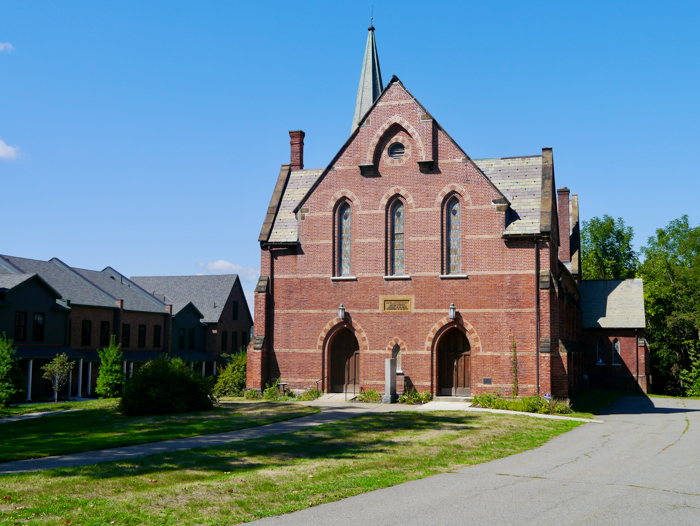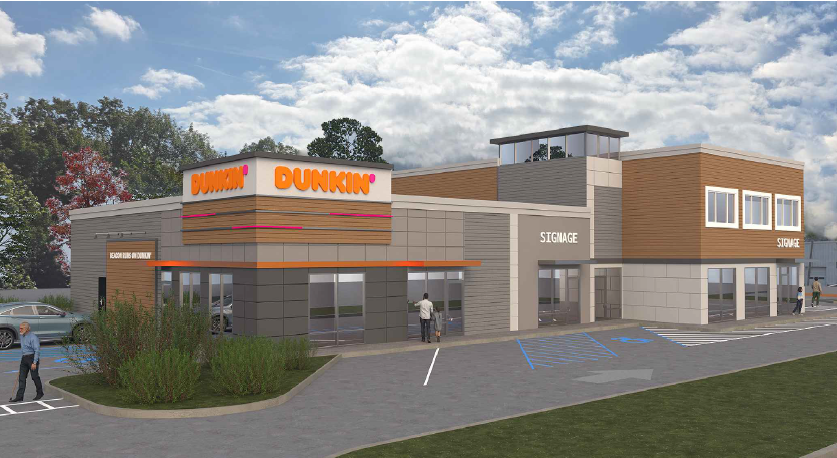Owners want larger restaurant instead of venue
The owners of Prophecy Hall, a hotel, restaurant and event center slated to open at the former Reformed Church of Beacon on Wolcott Avenue, have asked the Planning Board to amend the project’s approval to allow a 150-seat restaurant instead of the event venue.
The project was approved in August 2023, more than two years after its introduction, allowing an investment team to transform the 165-year-old church into a venue for art, theater and music with an ancillary 50-seat restaurant. An adjacent parsonage was to be renovated and expanded into a 30-room hotel.
According to materials submitted to the Planning Board before its Tuesday (Dec. 10) meeting, the owners now would like to operate a fine-dining restaurant in the space that would be open 365 days per year. The hotel would remain. No reason was given for the change.
If approved, the facility would offer brunch and dinner to the public and breakfast and snacks to hotel guests. The proposed hours are 7 a.m. to 9 p.m. Sunday through Thursday and 7 a.m. to 10 p.m. on Friday and Saturday. The developers anticipate hosting weddings and other private events but at a “much-reduced frequency” than planned for the event center.

The site has 33 parking spaces. Another 29 spaces at 21 South Ave. — used most recently as temporary parking for St. Andrew & St. Luke Episcopal Church during construction of the Beacon fire station — would be reserved for valet parking. The South Avenue lot is owned by one of the Prophecy developers.
The site’s operating hours and parking were contentious issues during a public hearing on the original proposal that was kept open for nearly a year. Before its approval, the capacity for the event center was reduced four times, with operating hours scaled back so events ended no later than 8:30 p.m.
On Tuesday, Aryeh Siegel, the project architect, said the Prophecy owners have approached neighbors and “generally feel there is more support for the restaurant, so far.” A consultant estimated that the new proposal would generate about 20 percent more traffic than the approved project. At peak demand, customers could use the municipal lot at the fire station or street parking on Tompkins Avenue or Beekman Street, he said. Employees would use off-site public parking in the area.
Board Member Kevin Byrne questioned whether a 150-seat restaurant could be considered an “accessory use” to the hotel. The city zoning code permits hotel and “hotel-related” accessory uses in the historic district. It also allows restaurants in the district with a maximum capacity of 50, but the Planning Board has leeway to approve a higher number.
“What is the balance there?” Byrne asked. “It seems like you’re changing fundamentally the approval. You’re asking for a variance, it almost seems.”
“That’s actually one of the questions about the application,” said Jennifer Gray, the Planning Board attorney. “Is the applicant proposing a restaurant accessory to the hotel or two separate uses — a sit-down restaurant that needs to have the increased capacity, with the separate hotel?”
The developers said they still plan to restore and maintain the historic cemetery behind the church and will submit a new traffic study within the first nine months of operations. Both had been conditions of the previous approval. Noise-mitigating measures included in the first approval will also remain.
45 Beekman St.
The Planning Board will begin next month to discuss environmental impacts related to the proposal to demolish a structure at the corner of Beekman Street and Route 9D and construct two four-story buildings with commercial space and 64 apartments.
Among the changes made to the proposal are sidewalk connections at the Route 9D/Beekman intersection, street trees in front of the first of the two buildings on Beekman and canopy trees adjacent to the building. Maple trees planned between the buildings were moved closer to Beekman.

A corner clock tower on the first building has also been chamfered to eliminate a proposed column. The project is “headed in the right direction,” said John Gunn, the Planning Board chair, on Tuesday.
An adaptive traffic signal system has been installed by the state Department of Transportation and will soon be functional along Route 9D from Beekman to Interstate 84. The DOT said it did not support adding a southbound right-turn lane onto Beekman for the project but said one could be considered in the future.
The adaptive system will not solve congestion issues on that stretch of 9D but could help “squeak out a little bit more capacity,” said Ken Wersted, a city traffic consultant.
420-430 Fishkill Ave.
Project officials on Tuesday introduced several elements to a proposal to merge three lots and convert a building at 420-430 Fishkill Ave. to a Dunkin’ coffeehouse with a drive-thru, commercial space and three apartments. The site was formerly the Healey Brothers Ford dealership.
The developers now propose a crosswalk at the intersection of Fishkill Avenue and Townsend Street. Because there is no traffic signal, planning consultant Natalie Quinn recommended using a rapid-repeat flashing beacon for pedestrian visibility.

In addition, the applicant said they are willing to grant an easement to the city to create a path between the site and the proposed Beacon-to-Hopewell rail trail that, if built, would be downhill. The easement would be conditioned upon construction of a trail.
A paved outdoor patio with three tables and three benches within a landscaped area were also added to the plans. A sidewalk is planned but would not be constructed until the City Council receives recommendations regarding the width of the right-of-way and potential sidewalk improvements from a citizen committee studying the Fishkill Avenue corridor.
Building Inspector Bruce Flower said a drive-thru is permitted in the corridor, which is zoned for general business. There had been some question because restaurants and coffeehouses are allowed in the zone but fast-food establishments are not. Because nearly 60 percent of Dunkin’s sales are for coffee or other beverages, the franchise fits the zoning code definition of a coffeehouse, he said.
There was a lengthy back-and-forth with board members about building design and the efficiency of the parking lot and lanes leading to and from the drive-thru, which is expected to accommodate up to 12 vehicles at peak times. Byrne asked the applicant to improve the design and layout, saying “it would behoove you to be an example, to contribute” to a better overall experience on Fishkill Avenue. Until then, “I think we reserve judgment on this,” he said.


Beacon already has a significant number of local coffee shops and roasters, and a Dunkin’ across the street (where Roma Nova is now) closed during the pandemic and another at Route 52 and Old Glenham Road (at the Sunoco station) went out of business.
After extensive community input regarding the revitalization and rezoning of the Route 52 corridor, many residents asked for businesses that serve essential needs, such as grocery stores, and bicycle lanes or other services that contribute to local life. Dunkin’ does not align with those priorities.
It is unclear how this proposal received support, given the challenges Dunkin’ has faced locally.